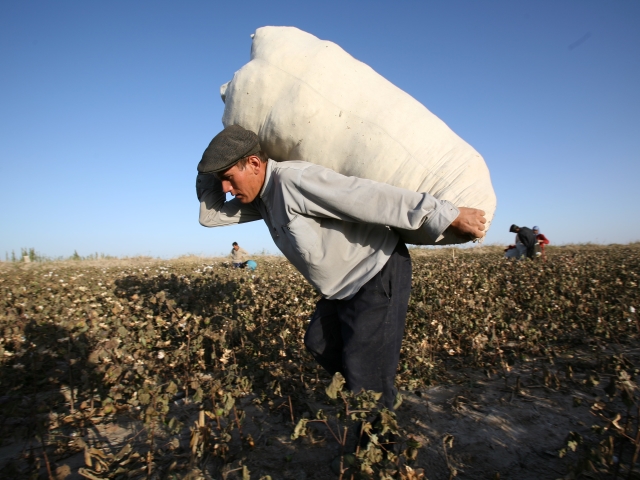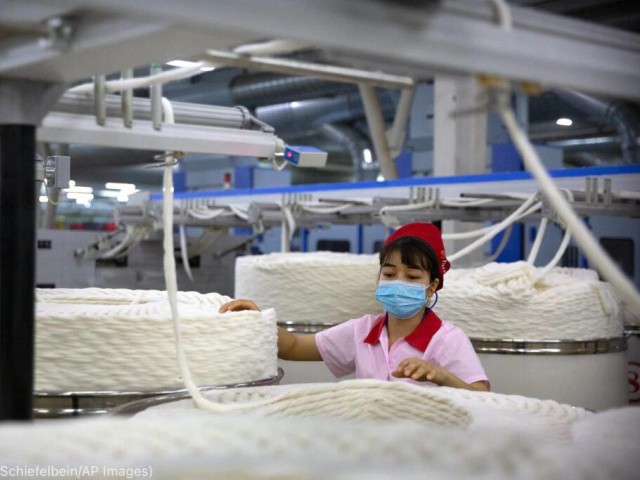The House Select Committee on the Chinese Communist Party on Thursday warned there is an “extremely high risk” of encountering products made by slaves when shopping with two popular Chinese fast-fashion brands: Shein and Temu.
The interim report, titled “Fast Fashion and the Uyghur Genocide,” found the Chinese brands exploiting the de minimis provisions of the Uyghur Forced Labor Prevention Act (UFLPA) to evade scrutiny.
The UFLPA, which went into effect in June 2022, established tough new standards for ensuring the supply chains of products exported to the United States are free of forced labor. The law effectively assumes that everything manufactured in “Xinjiang province” — China’s name for East Turkestan, the ancestral home of the oppressed Uyghur Muslims — is made or put together by slaves unless proven otherwise.
Xinjiang is the source of a great deal of China’s cotton and China is the largest cotton producer in the world, so the fashion industry worried that the difficult task of ensuring slaves did not produce Chinese garments could shut down exports. A provision of the UFLPA sought to alleviate this concern by waiving extensive inspection requirements for shipments valued at $800 or less. Such parcels are also granted exemptions from import taxes.
According to the House Select Committee report, Temu and Shein aggressively exploited this exemption, to the point where those two companies now account for over 30 percent of all packages shipped to the United States under the de minimis provision.
The report further noted that Temu, an online superstore for fashion items, makes no real effort to ensure its legion of third-party sellers is not shipping goods produced by slaves to the United States.

A worker carries a bag of picked cotton on October 20, 2005, in the Xinjiang Uyghur Autonomous Region city Maigaiti, China. (Photo by Chien-min Chung/Getty Images)
Temu and Shein are paramount examples of “fast fashion,” an industry that bombards consumers with a huge volume of cheap and quickly produced items, often pushed by social media influencers. The exploitation of workers and negative environmental impact are often cited by critics of the industry, along with a sort of fashion gluttony it inspires, as customers buy from an ever-changing carousel of extremely cheap products and discard the garments after wearing them only a few times.
House Select Committee on the Chinese Communist Party chair Rep. Mike Gallagher (R-WI) said the results of the report were “shocking.”
“Temu is doing next to nothing to keep its supply chains free from slave labor. At the same time, Temu and Shein are building empires around the de minimis loophole in our import rules – dodging import taxes and evading scrutiny on the millions of goods they sell to Americans,” Gallagher said.
“The initial findings of this report are concerning and reinforce the need for full transparency by companies potentially profiting from CCP forced labor,” said the committee’s ranking Democrat, Rep. Raja Krishnamoorthi (D-IL).
“Our Select Committee heard from experts under oath that these practices persist to this day and we intend to strengthen laws like the Uyghur Forced Labor Prevention Act to put an end to them once and for all,” Rep. Krishnamoorthi said.

A worker watches as a machine processes cotton yarn at a Huafu Fashion plant, as seen during a government-organized trip for foreign journalists, in Aksu in western China’s Xinjiang Uyghur Autonomous Region, Tuesday, April 20, 2021. A backlash against reports of forced labor and other abuses of the largely Muslim Uyghur ethnic group in Xinjiang is taking a toll on China’s cotton industry, but it’s unclear if the pressure will compel the government or companies to change their ways. (AP Photo/Mark Schiefelbein)
“American consumers should know that there is an extremely high risk that Temu’s supply chains are contaminated with forced labor. And all companies operating in the United States have an obligation to clean up their supply chain and ensure that they are not contributing to the CCP’s genocide of the Uyghur people by facilitating the sale of goods made with forced labor,” the committee leaders said in a joint statement.
Shein is in the midst of a public-relations campaign to dispel accusations of forced labor. In May, Shein and a number of other fashion companies received a letter from Rep. Gallagher’s committee asking for details of their compliance with the Uyghur Forced Labor Prevention Act. It was the second time Shein has received such a request since the House Select Committee on the Chinese Communist Party was established.
Also in May, a different bipartisan group of lawmakers asked the Securities and Exchange Commission (SEC) to halt an initial public offering (IPO) by Shein until it can prove it does not sell products made by slaves. The SEC letter called for an independent audit of the company’s supply chains.
Shein claimed it had conducted previously confidential third-party audits that supposedly proved 98 percent of its cotton does not come from East Turkestan and only a small percentage of its exports to the United States used cotton at all. Skeptics noted the non-cotton products could be tainted by slavery and it would be much more difficult to verify they were not made in Xinjiang.
“We have little confidence in Shein and what they claim,” Chapin Fay, director of an advocacy group named Shut Down Shein, said in early June.

COMMENTS
Please let us know if you're having issues with commenting.